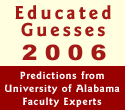 Look for cities and counties in the Hurricane Katrina-affected areas to have trouble proving their true populations in the months ahead, predicts a University of Alabama census data analyst.
Look for cities and counties in the Hurricane Katrina-affected areas to have trouble proving their true populations in the months ahead, predicts a University of Alabama census data analyst.
Annual population estimates are relied upon by various governmental agencies in determining things like the child-care needs of a geographic area, according to Annette Watters, manager of the Alabama State Data Center at The University of Alabama’s Center for Business and Economic Research. However, Hurricane Katrina put a crimp in the census statistical system, Watters said, noting that people affected by the storm have moved to temporary quarters throughout the Gulf Coast, making it difficult for the Census Bureau to make accurate estimates.
“People moved into Alabama temporarily when they were displaced from Mississippi or Louisiana,” Watters said. “Some will return home during 2006 as reconstruction and restoration continue. People from Alabama with construction trades have been moving to other Gulf states to help with rebuilding. When their jobs are done there, they intend to again live fulltime in Alabama.”
Watters said the confusion brings up the question of what it means to “live somewhere. Is it where you are staying for several months — even a year — while you are dislocated? Is it where your permanent home is? Do you live in Alabama, even if you are spending long periods of time working somewhere else? Or do you live there for the time you are working there? People have different opinions about the answers to those questions.”
Cities and counties rely on accurate demographic information in seeking federal grants and library funding allocations and in calculating items as varied as per capita personal income or the rate of common diseases.
“The federal government counts people every 10 years and in the years in between the census, it makes estimates. The census has very sophisticated statistical methodologies and the annual population estimates aren’t just guesses,” Watters said.
Many estimates that were relatively easy to obtain in previous years will be more difficult in 2006, she said.
Contact
Office of Media Relations, 205/348-5320Annette Watters, 205/348-6191 (office), 205/345-5661 (home), awatters@cba.ua.edu